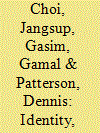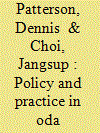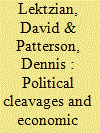|
|
|
Sort Order |
|
|
|
Items / Page
|
|
|
|
|
|
|
| Srl | Item |
| 1 |
ID:
109078


|
|
|
|
|
| Publication |
2011.
|
| Summary/Abstract |
While work on the political behaviour of religious groups in America has shown that, among other things, religious commitment and strong opinions on salient issues can encourage turnout and raise the probability of these groups' members voting in national elections, much less is known about these relationships with respect to Muslim Americans. Using data collected at mosques in 2006 during the holy month of Ramadan, this article maps the turnout patterns of Muslim American respondents and then investigates the factors that explain the political participation of members of this increasingly important religious group. The article focuses on reported turnout in the 2004 presidential election and shows that, more than anything else, strong opinions on salient issues boosted the participation rates of members of this religious group in the election, even when controlling for other factors known to help explain turnout.
|
|
|
|
|
|
|
|
|
|
|
|
|
|
|
|
| 2 |
ID:
167835


|
|
|
|
|
| Summary/Abstract |
South Korea is the only nation to become an important donor nation after being a recipient of Official Development Assistance (ODA) for several decades. In 2010, it became a member of the OECD's Development Assistance Committee, and while it has continued to use its experience as a former ODA recipient to inform its distribution practices, it also has evolved its ODA policies in response to changes in international norms and the imperatives associated with being a DAC-member nation. We know that, while policies may change, actual ODA disbursements—which nations are selected as recipients and receive ODA in what amounts—may lag or even remain unchanged. In this paper, we use the case of South Korea to determine how actual ODA disbursements change in response to policy changes. To accomplish this, we use a selection model to conduct a statistical analysis of South Korea's ODA disbursements using dyadic data from 1987 to 2016. Our results indicate that, while there has been continuity in terms of which nations receive South Korean ODA, there were also notable changes in its disbursements. Specifically, the ODA policy changes the South Korean government enacted did result in an altered profile of nations that were targeted by South Korea as ODA recipients.
|
|
|
|
|
|
|
|
|
|
|
|
|
|
|
|
| 3 |
ID:
138298


|
|
|
|
|
| Summary/Abstract |
We develop and test a theory, based on the Stolper–Samuelson Theorem, of the effectiveness of sanctions. We treat sanctions as exogenously imposed changes in a country's exposure to international markets. In a country with an open-trade regime, owners and intensive users of the abundant factor of production hold economic and political power. In a country closed to trade, however, economic and political power rests with owners and intensive users of scarce factors. Thus, if real rates of return to the abundant factor decline during sanctions against a trade-open country, or real rates of return to the scarce factor decline during sanctions against a trade-closed country, we expect these economically and politically powerful segments of the targeted country to push hard for policy changes that would bring about an end to sanctions. Statistical analysis of sanctions episodes initiated between 1971 and 2000 provides support for the paper's expectations.
|
|
|
|
|
|
|
|
|
|
|
|
|
|
|
|
|
|
|
|
|